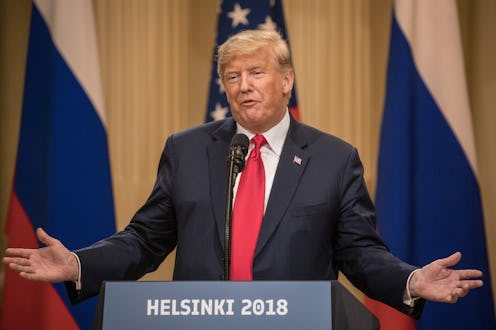News
Trump Claims He Totally Didn’t Mean To Say What He Said About Russia & The Election

One day after President Trump and Vladimir Putin held a controversial press conference in Helsinki, criticism against the president's comments spread like fire. Speaking to reporters on Tuesday, Trump clarified his remarks on Russian election meddling, saying that he misspoke a crucial word that changed the entire meaning of his comments about Russia's role in the 2016 election.
"In a key sentence in my remarks," the president told reporters, "I said the word would instead of wouldn't. The sentence should have been, 'I don't see any reason why it wouldn't be Russia.' Sort of a double negative. So you can put that in, and I think that probably clarifies things." Still, the president denied any Russian influence on the 2016 American presidential election.
For reference, on Monday as he spoke with reporters from across the world, Trump said, "My people came to me — Dan Coats came to me and some others — they said they think it's Russia. I have President Putin; he just said it's not Russia. I will say this: I don't see any reason why it would be, but I really do want to see the server. But I have — I have confidence in both parties. I really believe that this will probably go on for a while, but I don't think it can go on without finding out what happened to the server."
Trump also said, "I addressed directly with President Putin the issue of Russian interference in our elections. I felt this was a message best delivered in person. Spent a great deal of time talking about it. And President Putin may very well want to address it, and very strongly, because he feels very strongly about it, and he has an interesting idea."
Perhaps the president didn't realize that his commentary and performance had ruffled the feathers of both liberal and some conservative viewers. In one instance, Fox Business' Neil Cavuto called Trump's performance "disgusting." Cavuto said that, as the president of the United States, Trump should have had a more assertive stance and rhetoric while speaking in front of Putin.
"A U.S. president on foreign soil talking to our biggest enemy, or adversary, or competitor — I don't know how we define them these days — is essentially letting the guy get away with this, and not even offering a mild criticism. That sets us back a lot," he said.
Trump's political peers, too, seemed to be unhappy with his performance. From House Speaker Paul Ryan to Senate Majority Leader Mitch McConnell, the running consensus seemed to be that Trump should have had expressed American dominance and confidence in front of Russia. As he spoke with reporters, Ryan said, "There is no moral equivalence between the United States and Russia, which remains hostile to our most basic values and ideals. The United States must be focused on holding Russia accountable and putting an end to its vile attacks on democracy."
The president's demeanor also seemed different than that on Monday. As he spoke in Helsinki along with Putin, Trump used little to no notes to refer to during his comments. On Tuesday, however, the president brought with him several papers and in one case, written with a thick Sharpie, Trump's paper said, "There was no collusion."
Prior to giving comments to the press, Trump took to Twitter where he ranted against the "fake news" media. The meeting with Putin was "even better," he said and added that he raised "vast amounts of money." But some of his observers, including CNN reporter Erica Orden, tweeted that Trump's supposed clarification seemed dubious. "Trump gave an extensive sit-down interview to @seanhannity immediately following the press conference with Putin," Orden said. "No clarification was made."